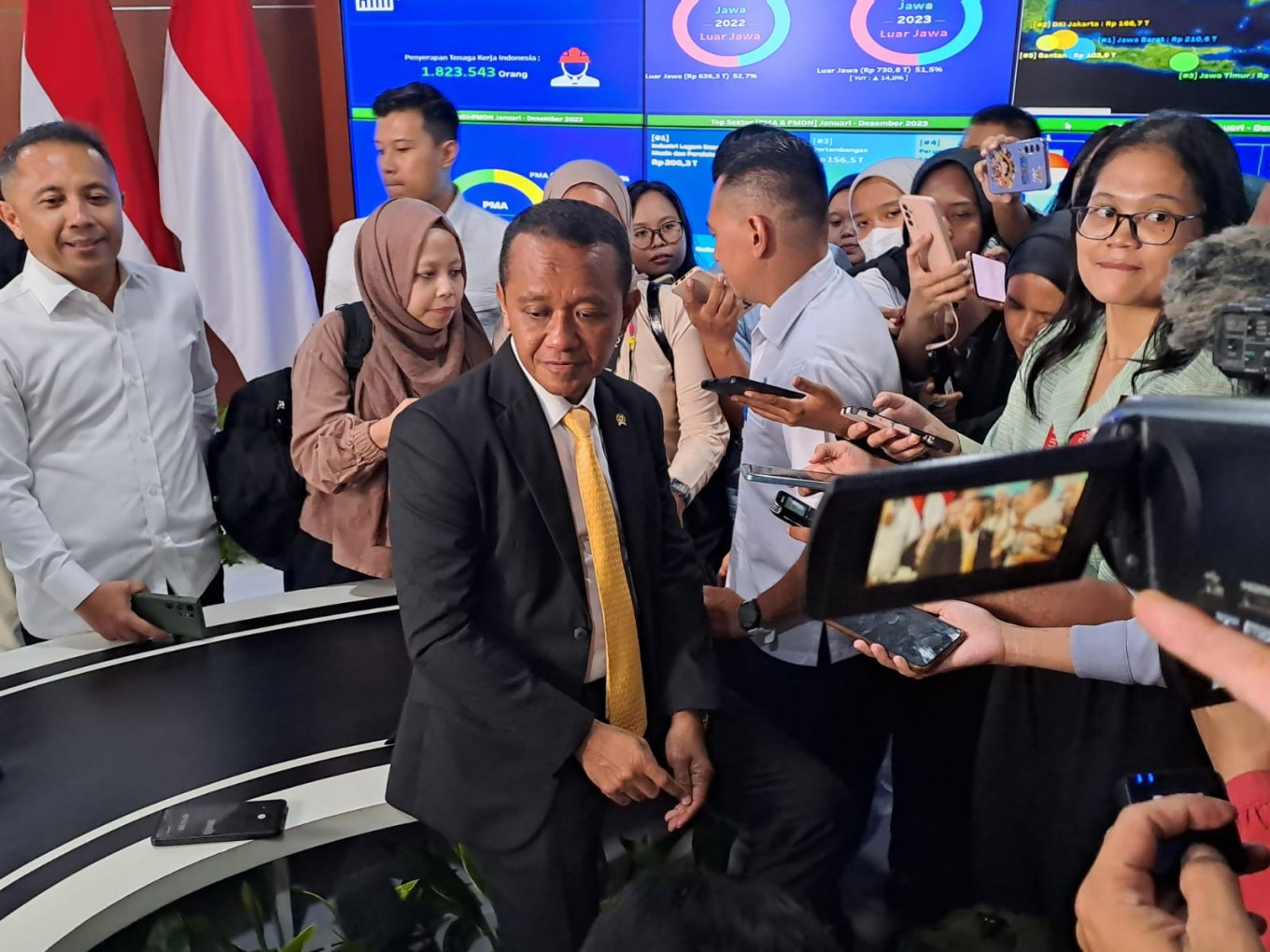News
Bahlil redirects crude oil, gas exports to domestic supply
Tenggara Strategics February 4, 2025 Investment Minister Bahlil Lahadalia prepares to speak with reporters at the ministry’s building in Jakarta on Jan. 24, 2023. (The Jakarta Post/Deni Ghifari)
Investment Minister Bahlil Lahadalia prepares to speak with reporters at the ministry’s building in Jakarta on Jan. 24, 2023. (The Jakarta Post/Deni Ghifari)
As part of President Prabowo Subianto’s flagship program to achieve energy self-sufficiency, Energy and Mineral Resources Minister Bahlil Lahadalia announced a halt to crude oil and gas exports. Instead, all crude oil will be processed in domestic refineries to boost national fuel production and strengthen energy security, with natural gas prioritized for the domestic industrial downstream industry.
In addition to halting crude oil exports, the government is taking proactive measures to ensure that all domestically produced oil is utilized efficiently. Crude oil from contractors that do not meet domestic refinery specifications will also be processed and blended to ensure compatibility. Bahlil emphasized that this policy shift is a strategic step to accelerate Indonesia’s energy self-sufficiency.
Crude oil exports this year are projected to reach around 28 million barrels (approximately 13.8 percent of yearly production). Out of this volume, a significant portion – estimated between 12 and 13 million barrels is targeted to be processed domestically. This policy is anticipated to enhance national fuel supply while concurrently diminishing reliance on fuel oil imports.
State oil and gas holding company Pertamina operates six refineries in Indonesia with a total processing capacity of 1,046,700 barrels per day (bpd) of crude into fuels to supply the domestic fuel market. The three largest refineries are Cilacap, with 348 million barrels of crude per day (MBCD), Balikpapan (260 MBCD) and Dumai (170 MBCD). Furthermore, the government is accelerating the construction of new refineries, such as the Tuban and Balongan projects, to enhance processing capacity in the years to come.
The ministry is actively working to improve the capabilities and adaptability of domestic refineries. Significant advancements have been made, with major refineries now equipped to process a wider range of crude oil types, including those previously deemed unsuitable.
Despite its large capacity, most crude oil is imported as domestic production of crude oil has been declining for years from over 1 million bpd in the 2000s to 578,272 bpd in the first half of 2024, representing a 4.53 percent decrease from the 605,000 bpd from the preceding year's corresponding period.
In addition to crude, Indonesia produce 2.86 billion standard cubic feet per day (SCFD) of gas (approximately 494,000 bpd oil equivalent).
From the demand side, Indonesia consumes approximately 1.3 million barrels of oil per day (BOPD). So, domestic production falls far short of this demand. Thus, the rest of the crude oil for domestic refineries needs to be imported.
Because of continuing importation of crude oil and fuels, Indonesia has been suffering from a trade deficit in the oil and gas sector. Indonesia had a trade deficit in 2024 of US$20.4 billion in the oil and gas sector, with oil and gas exports reaching $15.87 billion and imports totalling $36.27 billion. In 2023, the country’s oil and gas sector had a similar trade deficit of $19.91 billion, with exports of only $15.92 billion and imports at $35.83 billion.
This widening trade deficit highlights Indonesia’s persistent reliance on imported energy to meet domestic demand, despite efforts to enhance local production. The growing gap between imports and exports further underscores the challenges in achieving energy self-sufficiency, as the country continues to depend on foreign sources to fill the gap between production and consumption. The deficit will widen when international prices for crude oil increase.
Global oil prices saw a downturn this past week, snapping a four-week winning streak. This downturn followed United States President Donald Trump’s announcement of a plan to significantly increase domestic production, coupled with his demand for OPEC to lower crude oil prices. Brent crude oil futures gained 21 cents or 0.27 percent to $78.50 per barrel, while US Wes Texas Intermediate (WTI) crude oil saw a modest 0.05 percent gain, closing at $74.66 per barrel.
Furthermore, prioritizing domestic refining of crude oil can mitigate the impact of geopolitical instability on fuel supply. Oil prices exhibit extreme sensitivity to geopolitical developments. This volatility stems from oil’s critical role in the global economy, making it highly susceptible to disruptions caused by geopolitical events.
President Prabowo emphasizes the need for Indonesia to achieve energy self-sufficiency. This is crucial given the vulnerability of global energy supplies to unpredictable geopolitical events, including the potential for conflict. In times of crisis, nations often prioritize domestic energy security. Therefore, reducing reliance on energy imports is crucial for Indonesia to ensure energy self-sufficiency.
What we've heard
Some oil and gas industry players were surprised by the statement of the Energy and Mineral Resources Minister Bahlil Lahadalia, that he would stop crude oil and gas exports to prioritize domestic needs. According to them, this idea would be difficult to implement given that Indonesia’s crude oil characteristics do not match the specifications of existing refineries. As a result, most domestic crude oil cannot be processed in Indonesian refineries.

